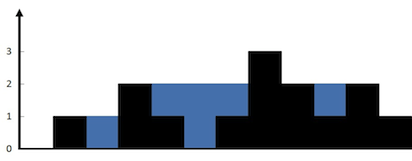42. Trapping Rain Water
Description
Given n non-negative integers representing an elevation map where the width of each bar is 1, compute how much water it can trap after raining.
Example 1:

Input: height = [0,1,0,2,1,0,1,3,2,1,2,1] Output: 6 Explanation: The above elevation map (black section) is represented by array [0,1,0,2,1,0,1,3,2,1,2,1]. In this case, 6 units of rain water (blue section) are being trapped.
Example 2:
Input: height = [4,2,0,3,2,5] Output: 9
Constraints:
n == height.length1 <= n <= 2 * 1040 <= height[i] <= 105
Solutions
Solution: Two Pointers
- Time complexity: O(n)
- Space complexity: O(1)
JavaScript
js
/**
* @param {number[]} height
* @return {number}
*/
const trap = function (height) {
let left = 0;
let result = 0;
let maxHeight = 0;
let right = height.length - 1;
while (left < right) {
const minHeight = Math.min(height[left], height[right]);
maxHeight = Math.max(minHeight, maxHeight);
result += maxHeight - minHeight;
minHeight === height[left] ? (left += 1) : (right -= 1);
}
return result;
};